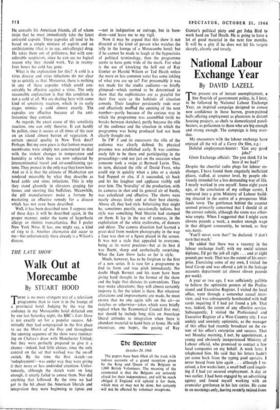Walk Out at Morecambe
THE LATE SHOW
By STUART HOOD
MHERE is no more stringent test of a television I programme than to view it in the lounge of a provincial hotel. Judging by the way the audience in my Morecambe hotel defected one by one last Saturday night, the BBC's Late Show is not exactly set for a popular success. Ad- mittedly they had congregated in the first place to see the Match of the Day and throughout the opening sequence of the show were ruminat- ing on Chelsea's draw with Manchester United; but they were perfectly prepared to give it a chance—indeed, had little choice, since the only control on the set that worked was the on-off switch. By the time the first sketch—on `redeployment'—was under way they were giving it their more or less undivided attention. Unfor- tunately, although the sketch went on long enough, it utterly failed to amuse them. Nor did anything that followed. By the time we had got to the bit about the American liberals and integration they were beginning to tiptoe out
—not in indignation or outrage, but in bore- dom—and leave me to my vigil.
Now it may be argued that this show is not directed at the kind of person who watches the telly in the lounge of a Morecambe hotel; but if he cannot be made to laugh at the hypocrisies of political terminology, then the programme seems to have gone wide of the mark. For what is the use of knocking the hell out of Ray Gunter or Harold Wilson or Ted Heath unless the more or less common voter has some inkling of what you are up to? For presumably it was not made for the studio audience—so briefly glimpsed—which seemed to be determined to show that the sophisticates are as grateful for their free seats as the habitues of situation comedy. Their laughter persistently rode over and effectively muffled the opening of the next number—partly because of the curious way in which the programme was assembled (with no breaks between sketches), partly because the role of the audience and the situation in which the programme was being produced had not been clearly thought out.
In TW 3 and its successors the rOle of the audience was clearly defined. Its physical presence was established early. It was continu- ously felt to be there and participating in the proceedings—and not just on the occasion when someone took a swipe at Bernard Levin. This, in turn, dictated the rOle of David Frost, who could nip in quickly when a joke or a sketch had flopped or else, if it succeeded, sit back and let the laughter and applause visibly roll over him. The 'brutality' of the production, with its cameras in shot and its general air of bustle, was calculated and effective. The shows were nearly always lively and at their best electric. Above all, they had style. Infuriating they might be, sometimes puerile, occasionally tedious, but style was something Ned Sherrin had stamped on them. It lay in the use of cameras, in the exploitation of the white cyclorama, of dancers and decor. The camera direction had learned a great deal from modern photography in the way a face was shot or a figure placed in the screen. It was not a style that appealed to everyone, being at its worst precious—but at its best it was fluent, sharp and aesthetically surprising. What the Late Show lacks so far is style.
Much, however, has to be forgiven to the first of a new series. It is rare for a programme to find its form and true pitch immediately. No doubt Hugh Burnett and his team have been giving hard thought to the format of the show and the logic that dictates its conventions. They may make alterations; they will almost certainly improve it, for the talent is there. But whatever alterations and improvements are made, he must ensure that no one again tells on the air—as sketches or otherwise—jokes which were briefly topical when the Ecumenical Council first met; nor should he include long skits on American liberal attitudes to integration when there is abundant material to hand here at home. He will encourage, one hopes, the guying of Ray Gunter's political piety and get John Bird to work hard on Ted Heath. He is going to have a lot of good material in the next few months. It will be a pity if he does not hit his targets sharply, cleanly and tersely.


































 Previous page
Previous page